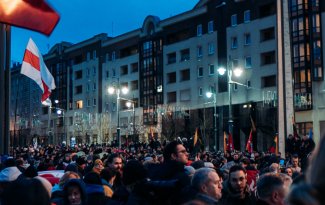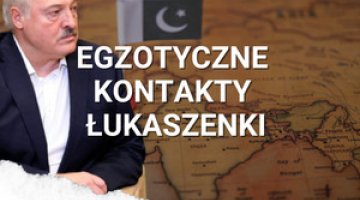Increasingly distant neighbours: Lithuania towards Belarusians

In the last three years Belarusians have become the fastest growing group of foreigners in Lithuania. At present, the Belarusian diaspora in this country numbers some 61,000 people, 80 percent of whom have settled there primarily for economic reasons: they have found jobs mainly in the construction and logistics sectors, and also set up their own businesses. It is increasingly rare for them to arrive in Lithuania on the so-called humanitarian visas, which can be obtained by those whom the regime of Alyaksandr Lukashenka has persecuted; 700 such visas have been issued so far. Although Belarusians are playing an important role by filling gaps in the Lithuanian labour market, their influx has sparked growing concerns among Lithuanian society. The country’s secret services have warned that the new arrivals may include people infiltrated by Russian and Belarusian intelligence services, which poses a potential threat to national security.
The issue of legal migration from Belarus to Lithuania has become one of the most pressing topics in public debate, involving senior government officials, politicians, analysts and the general public. The political dispute centres on the dilemma of whether the country should accept the growing numbers of incoming Belarusians or take action to curb this trend. This discussion has raised concerns among the leaders of the Belarusian opposition in exile. Sviatlana Tsikhanouskaya, the leader of the democratic forces, has defended the interests of her compatriots by opposing attempts to hold them jointly responsible for the invasion of Ukraine by the Russian Federation and the Republic of Belarus.
Migrants from Belarus as a problem for the state
Belarusians are currently the second largest group of foreigners in Lithuania. Only Ukrainians (86,000) are more numerous, although their numbers have decreased over the last year. The Belarusian diaspora has grown rapidly over the past three years. On 1 January 2020, eight months before the rigged presidential elections in Belarus, almost 17,800 Belarusians lived in Lithuania. In January 2021, after the mass protests against the Lukashenko regime, this figure reached 23,400.
By early 2023, the number of Belarusians in Lithuania had doubled to 48,800. The upward trend also continued through 2023: as of 1 October, this figure stood at around 61,000. In contrast, the number of Russian citizens in Lithuania has increased only marginally, to just over 16,000. The migration of Russians was curtailed following Lithuania’s tightening of visa rules in 2022 and its adoption in April 2023 of a law on restrictive measures in connection with Russia’s invasion of Ukraine.
Lithuania’s special services, including the State Security Department (VSD) responsible for civilian intelligence and counter-intelligence, alerted politicians back in 2022 that the Belarusian migrants probably included people sent by the Lukashenko regime or Russian intelligence. According to the VSD, the activity of Belarusian intelligence agencies, such as the KGB, GRU and the GUBOPiK, the latter of which was set up to fight the opposition, has reached a ‘historically’ high level in Lithuania.
According to the VSD, the main objectives of these Belarusian spy rings include infiltrating the migrants to Lithuania and collecting information about the Belarusian diaspora and its organisations, the ways in which they entered the country, its intelligence institutions and control procedures on the Lithuanian border. One example of such infiltration is the case of Belarusian activist Olga Karach who has been living in Lithuania since 2014. In August 2023, Lithuanian migration services refused her asylum claim after the intelligence service accused her of maintaining contacts with Russian special services and providing them with information on the Belarusian opposition resident in Lithuania.
Screening migrants from the east
In late November 2022, Lithuania introduced a special procedure to screen Russian and Belarusian citizens, which has proved to be an effective tool for identifying undesirable persons on the country’s territory. This practice obliges migrants who apply to obtain or amend a document granting or confirming their right of residence in Lithuania, to obtain a new temporary residence permit, or to receive a national visa. Such people are required to fill in a questionnaire in which they must provide information about their education, their work experience to date, their service in the armed forces, and their business relations & contacts with institutions from non-NATO and non-EU countries; in addition, they must define their attitude to the Russian invasion of Ukraine. The Lithuanian Migration Department, which is responsible for issuing decisions to foreigners, uses data collected by the intelligence as well as the police and border guards in the process of screening applicants. These services also search for relevant data on social media and various online forums.
Within a year of the implementation of this questionnaire system, by November 2023, 2041 Russian and Belarusian citizens, including 1644 Belarusians, had been designated as threats to Lithuania’s national security. The Migration Department has reported that since November 2022, it has refused to grant temporary residence permits to 562 Belarusians and 76 Russians; it has also rejected the requests of 343 Belarusians and 84 Russians to have such documents renewed due to the expiry of the previous ones. In addition, it has revoked the permits that it previously issued to 450 Belarusians and 90 Russians. It has denied permanent residency to two nationals from each of these two countries, and revoked such documents from eight Belarusians and 90 Russians. Furthermore, 279 Belarusians have received negative responses to their applications for Lithuanian national visas.
The dispute over curbing migration from Belarus
This screening system, while effective in identifying potentially dangerous people, has failed to stem the growing numbers of migrants. In late November 2023, the head of the VSD again warned that at the current rate of influx of Belarusian citizens (currently around 17,000 per year), their numbers in Lithuania could reach 100,000 by 2025. The department expressed its concern that it would not be able to monitor this community effectively. This problem could be resolved by expanding the VSD’s workforce or curbing migration levels.
President Gitanas Nausėda has called for Belarusians to be subjected to similar travel sanctions to those introduced for Russians in April 2023. His move was clearly dictated by public sentiment, especially in the context of his bid for re-election in May 2024. Warnings from the country’s security services, the case of Karach as an illustration of the risks, and the relocation of Wagner Group mercenaries to Belarus have made the majority of Lithuanians increasingly concerned about rising migration. Consequently, they now favour stricter entry conditions for Belarusians: six out of ten Lithuanians expressed this view in a poll that the Baltijos tyrimai agency conducted between 22 September and 7 October 2023. Anti-Belarusian sentiment has also been fuelled by frequent acts aimed at inciting unrest in Lithuania, such as false reports of explosives being planted at schools and public places.
On the other side of the political debate are the leaders of the ruling conservative Homeland Union-Lithuanian Christian Democrats and two liberal groups. Prime Minister Ingrida Šimonytė, foreign minister Gabrielius Landsbergis of the Conservatives, and the speaker of the Seimas Viktorija Čmilytė-Nielsen of the Liberals, their junior coalition partner, have argued that the number of Belarusians negatively vetted by the migration services proves that the country’s security procedures are effective. Šimonytė has also highlighted the economic aspect of the immigrants’ presence on the Lithuanian labour market by pointing out that an additional 20,000 workers are needed to maintain the country’s economic growth.
Nationalists urge more control over migration
In the current discussion on the migration of Belarusians to Lithuania, the initiative lies mainly with those who are in favour of curbing this movement. In early December, three conservative politicians of the nationalist-Christian democrat right, the deputy speaker of the Seimas Paulius Saudargas, the chairman of the Seimas Committee on National Security and Defence Laurynas Kasčiūnas, and a member of the Seimas Committee on Foreign Affairs Audronius Ažubalis, defied the party leader Landsbergis by registering amendments in the Seimas to the aforementioned law on restrictive measures in connection with the invasion of Ukraine. They proposed the introduction of restrictions on the entry of Belarusian citizens, with exceptions for those fleeing persecution and for individuals with high professional skills which would allow them to take up jobs in Lithuania. The parliament has not yet debated this amendment.
On 12 December 2023, the same right-wing MPs presented to the Seimas a draft amendment to the law on the legal status of foreigners. Under their proposal, foreigners who have been living in the country for five years and who apply for an extension of their temporary residence permit will have to pass an exam in the Lithuanian language and the basics of the country’s constitution. Currently, this is only required of applicants for permanent residence. This amendment is designed to stop Belarusians from constantly extending their temporary residence permits, and to make them integrate faster and stop living isolated lives in their diaspora. It has been approved for debate and sent to parliamentary committees; a vote on this proposal is expected during the spring session of parliament.
The fact that these legislative initiatives have been tabled ahead of the parliamentary elections scheduled for 13 October 2024 indicates that Saudargas, Kasčiūnas and Ažubalis want to build up their political capital around the issues of security and protecting the national interests of Lithuanian people. Each of these MPs is likely to seek re-election in one of the single-mandate constituencies where Lithuanian voters elect half of their parliament. According to pre-election polls, the popularity of the opposition social democrats has been rising, which could mean a lower number of seats for the conservatives in the proportional vote.
Are Lithuanians and Belarusians growing further apart?
In the debate on the migration of Belarusians to Lithuania, MPs who seek to curb this trend have employed arguments that mainly emphasise the ideological differences between the two societies. Kasčiūnas has disputed the claims made by members of the Belarusian diaspora that citizens of Belarus do not support the Russian invasion of Ukraine by citing a Chatham House survey which showed that 36% of them are in favour of the invasion, 38% are not, while the rest have no opinion on this issue. He has also suggested that the percentage of those who support Russia’s policy could increase if rural residents were included in the survey. Kasčiūnas has also highlighted the fact that Belarusians are unconvinced about whether it is right for their country to pursue European integration: 41% of Belarusian respondents favour a union with Russia while only 13% prefer integration with the EU. Furthermore, he has raised the issue of Litvinism, a strand of Belarusian nationalism based on the assumption that the Grand Duchy of Lithuania was founded on Belarusian lands and that the basis of modern Lithuanian statehood is false. Even though historians from both countries do not take this idea seriously, and the Lithuanian services are unable to determine how many proponents of Litvinism there are among the migrants, some Lithuanian analysts and politicians have expressed the opinion that this idea creates an area of potential tensions. Kasčiūnas has also drawn attention to the negative aspect of the Russian language’s re-emergence in public life in Lithuania, especially in the services sector. In his opinion, this could lead to the gradual Russification of Vilnius and encourage migrants from the Central Asian nations to settle there.
In August 2023, the VSD issued a statement insisting that Litvinism does not currently pose a threat to Lithuania’s sovereignty and territorial integrity, but could heighten ethnic tensions. Tsikhanouskaya has said that the migrants from her country do not include any people who question Lithuania’s right to Vilnius or the country’s current borders, and that advocates of this concept in the diaspora are isolated individuals whose opinions have been amplified by the Lithuanian media. She has also claimed that the escalation of this issue could be the result of Belarusian and Russian propaganda campaigns designed to divide Belarusians and Lithuanians.
The reaction from pro-democratic Belarusians
For several months, Tsikhanouskaya has been actively lobbying Lithuanian officials and politicians to dismiss the idea of restricting Belarusians from entering Lithuania. She has also protested against cases where temporary residence permits were not extended to those who are already in the country, especially as local officials have failed to justify these refusals. However she has supported the introduction of legislation that would require Belarusians living in Lithuania for more than five years to prove their knowledge of Lithuanian, as have other representatives of the Belarusian diaspora such as Anatoly Lebedko and Vital Rymasheuski. This is an important gesture from the leaders of the Belarusian diaspora, as it demonstrates their desire to integrate into Lithuanian society rather than to create an isolated community. Tsikhanouskaya has also spoken out in favour of Western economic sanctions against Belarus and Russia. However, any attempts to equate Belarusians with Russians and to treat Belarusian people as accomplices to Russian aggression are particularly sensitive to her. She has highlighted the sabotage operations carried out by her countrymen, such as those who dismantled railway tracks in order to prevent military shipments to Ukraine, and mentioned the 14 Belarusian volunteers who have died fighting for that country. She has pointed out that her compatriots who have arrived in Lithuania on work visas include participants in the mass protests againstLukashenka , and that the Belarusian diaspora has provided assistance to Ukrainian war refugees who found themselves in Lithuania.
Tsikhanouskaya and other Belarusian opposition leaders are concerned about the growing frustration among Belarusian migrants at the perception they are hostile to the Lithuanian state. This situation could lead to the formation of much more dangerous anti-Lithuanian attitudes than Litvinism, which could pose a serious challenge to relations between the two communities.
Summary: the need for a coherent strategy towards Belarusian society
After the mass demonstrations in Belarus in August 2020, Lithuania acted as an advocate for the interests of the Belarusian opposition and citizens who stood up to the dictator. The Lithuanian government’s support for the persecuted was seen as an investment in building close relations with the pro-democratic section of Belarusian society, which could potentially take power in the event the Lukashenka regime collapsed.
However, Belarus’s involvement in the war in Ukraine has changed the perceptions among the Lithuanian people, who have begun to see the Belarusians as a people as submissive to Lukashenka as the Russians are to Vladimir Putin. Prime Minister Šimonytė is aware of this. The current debate on curbing Belarusian migration has exposed the need to redefine Lithuania’s policy towards Belarus. The fundamental question facing Lithuanian decision-makers is how to perceive their neighbour nation following the Russian and Belarusian onslaught on Ukraine: whether to still treat it separately from the Lukashenka regime, as Tsikhanouskaya has urged, or to confine support to those who have been persecuted. The dividing line on the issue of migration from Belarus, which runs between the two key bodies responsible for foreign policy, the office of the president and the government, shows that it will be difficult to reach a consensus on this issue in Lithuania any time soon. The context of the upcoming presidential and parliamentary elections, in which this debate has been taking place, will influence its course and may mean that the Lithuanian public’s expectations will play the most prominent role in it.
Closing the border to a wider group of migrants from Belarus would severely restrict social contacts between the Lithuanian and Belarusian peoples, thus making it more difficult to transfer democratic ideas to Belarus and maintain contacts between Belarusian opposition leaders in exile and their compatriots at home. As a result of this, Belarusian society could gradually succumb to the pressure of the dictator’s regime, which would run counter to Lithuania’s interests.





